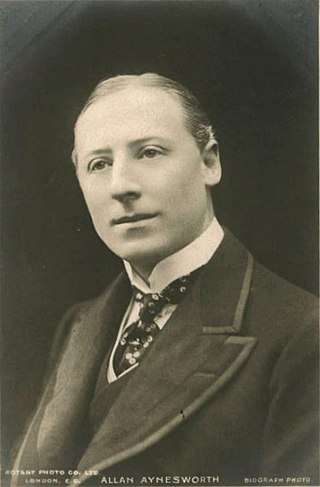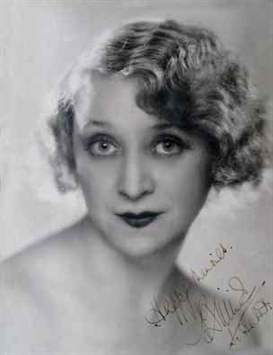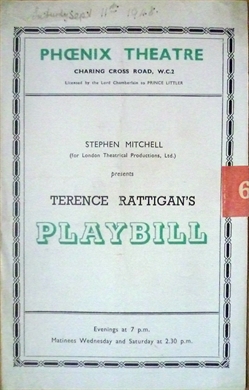Related Research Articles

Laurence Kerr Olivier, Baron Olivier was an English actor and director. He and his contemporaries Ralph Richardson and John Gielgud made up a trio of male actors who dominated the British stage of the mid-20th century. He also worked in films throughout his career, playing more than fifty cinema roles. Late in his career he had considerable success in television roles.

Friedrich Robert Donat was an English actor. He is best remembered for his roles in The Count of Monte Cristo (1934), Alfred Hitchcock's The 39 Steps (1935), and Goodbye, Mr. Chips (1939), for which he won the Academy Award for Best Actor.

Alastair George Bell Sim was a Scottish actor, who began his theatrical career at the age of thirty. He quickly became established as a popular West End performer, remaining so until his death in 1976. Starting in 1935, he also appeared in more than fifty British films, including an iconic adaptation of Charles Dickens’ novella A Christmas Carol, released in 1951 as Scrooge in Great Britain and as A Christmas Carol in the United States. Though an accomplished dramatic actor, he is often remembered for his comically sinister performances.
Sir Ralph David Richardson was an English actor who, with John Gielgud and Laurence Olivier, was one of the trinity of male actors who dominated the British stage for much of the 20th century. He worked in films throughout most of his career, and played more than sixty cinema roles. From an artistic but not theatrical background, Richardson had no thought of a stage career until a production of Hamlet in Brighton inspired him to become an actor. He learned his craft in the 1920s with a touring company and later the Birmingham Repertory Theatre. In 1931 he joined the Old Vic, playing mostly Shakespearean roles. He led the company the following season, succeeding Gielgud, who had taught him much about stage technique. After he left the company, a series of leading roles took him to stardom in the West End and on Broadway.

Kenneth George Hall was an Australian film producer and director, considered one of the most important figures in the history of the Australian film industry. He was the first Australian to win an Academy Award.

Edward Henry Abbot-Anderson, known professionally as Allan Aynesworth, was an English actor and producer. His career spanned more than six decades, from 1887 to 1949, and included the role of Algernon Moncrieff in the 1895 premiere of Oscar Wilde's The Importance of Being Earnest.

Beatrice "Binnie" Mary Hale-Monro was an English actress, singer and dancer. She was one of the most successful musical theatre stars in London in the 1920s and 1930s, able to sing leading roles in operetta as well as musicals, and she was popular as a principal boy in pantomime. Her best-remembered roles were in the musicals No, No, Nanette (1925) and Mr. Cinders (1929), in which she sang "Spread a Little Happiness".

John Stange(r) Heiss Oscar Asche, better known as Oscar Asche, was an Australian actor, director, and writer, best known for having written, directed, and acted in the record-breaking musical Chu Chin Chow, both on stage and film, and for acting in, directing, or producing many Shakespeare plays and successful musicals.

Reginald Leigh Dugmore, known professionally as Reginald Denny, was an English actor, aviator, and UAV pioneer.
Efftee Studios was an early Australian film and theatre production studio, established by F.W. Thring in 1930. It existed until Thring's death in 1935. Initially Efftee Films was based in Melbourne and used optical sound equipment imported from the US.

Miles Mander, was an English character actor, writer, director and producer in the post-war period of early British cinema during the 1920s to mid-1930s, as well as a playwright and novelist.

Ronald Alfred Shiner was a British stand-up comedian and comedy actor whose career encompassed film, West End theatre and music hall.

Ralph Clifford Lynn was an English actor who had a 60-year career, and is best remembered for playing comedy parts in the Aldwych farces first on stage and then in film.
Barbara Angell, also known as a performer as Barb Angell, Barbara Angela Angell, Barbara Angel and as a screenwriter Angela Barr, was Australia's first female television comedy writer-entertainer. She has also worked internationally in the United Kingdom, Europe and the United States.

Harlequinade is a comic play by Terence Rattigan.

Oliver Peters Heggie, billed as O. P. Heggie, was an Australian film and theatre actor best known for portraying the hermit who befriends the Monster in the film Bride of Frankenstein (1935). He was born Otto Peters Heggie at Angaston, South Australia to a local pastoralist. He was educated at Whinham College and the Adelaide Conservatoire of Music. He died in Los Angeles of pneumonia. He is buried at Woodside Cemetery, Yarmouth Port, Barnstable County, Massachusetts.

Charles Waldron was an American stage and film actor, sometimes credited as Charles Waldron Sr., Chas. Waldron Sr., Charles D. Waldron or Mr. Waldron.
Alec Coppel was an Australian-born screenwriter, novelist and playwright. He spent the majority of his career in London and Hollywood, specialising in light thrillers, mysteries and sex comedies. He is best known for the films Vertigo (1958), The Captain's Paradise (1953), Mr Denning Drives North (1951) and Obsession (1949), and the plays I Killed the Count and The Gazebo.

Helen Maud Holt, professionally known as Mrs Beerbohm Tree and later Lady Tree, was an English actress. She was the wife of the actor Sir Herbert Beerbohm Tree and the mother of Viola Tree, Felicity Tree and Iris Tree.
Last Cab to Darwin is a 2003 Australian drama/comedy stage play written by Reg Cribb and based upon the true story of taxi driver Max Bell who was diagnosed with terminal stomach cancer in the early 1990s. The 2003 production was presented both at the Sydney Opera House and the Octagon Theatre in Perth.
References
- ↑ Wearing, J. P. (2014). The London Stage 1930–1939: A Calendar of Productions, Performers, and Personnel. Rowman & Littlefield. p. 428. ISBN 9780810893047.
- ↑ "Across the Stage". The Daily Telegraph . Vol. I, no. 47. New South Wales, Australia. 6 October 1940. p. 23. Retrieved 30 June 2020– via National Library of Australia.
- ↑ "Short Circuit". The Observer. 31 March 1935. p. 17.